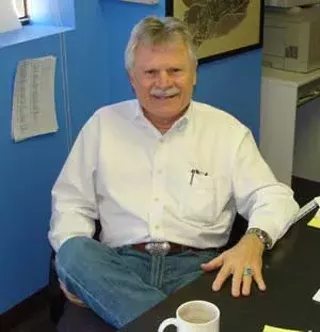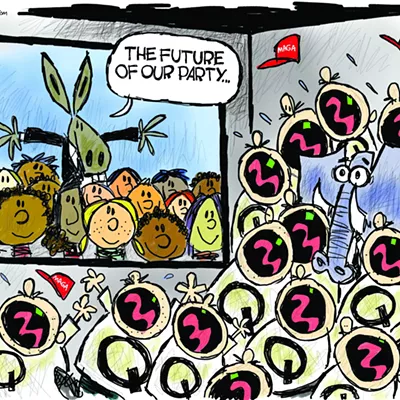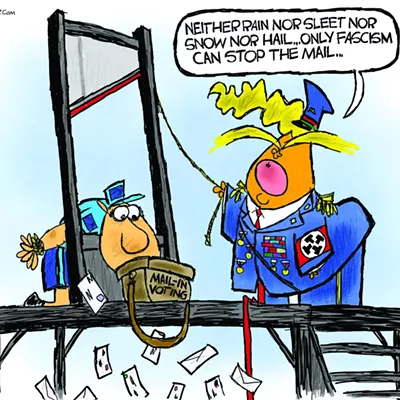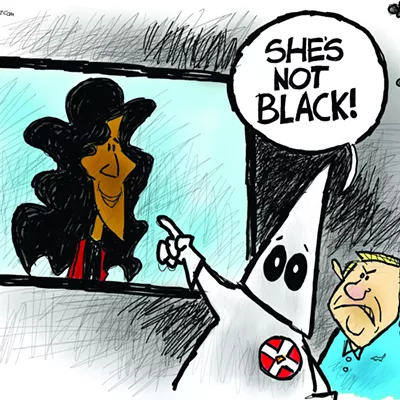But this is not your average legal document: This could be Democratic Party attorney Risner's last chance to get the ballots from the 2006 Regional Transportation Authority election.
At one time, election-integrity activists put all their faith in Attorney General Terry Goddard, hoping he would release the ballots for a recount as part of an investigation following election-fraud allegations by Risner and other election-integrity activists.
But so far, nothing has been released by Goddard, and Risner says he has growing doubts that the investigation will result in anything of substance to Risner and others who believe that the RTA election may have been rigged. Publicly, Goddard has told Risner that only a court order can release the ballots.
In June, Pima County Treasurer Beth Ford wrote a letter to all Pima County political parties and the Pima County Board of Supervisors, letting them know that she had to destroy the 2006 RTA ballots as required by state law. While representatives from the Democratic and Libertarian parties rushed to protest, attorney Ronna Fickbohm, an attorney representing the county, says Ford was doing the right thing.
After Ford's announcement and the flurry of protests that followed, the county hired the DeConcini McDonald Yetwin and Lacy law firm to represent Ford, and on July 22, Ford's attorneys asked Pima County Superior Court Judge Charles Harrington to determine the fate of the ballots.
As a result, there's been an ongoing legal bustle. Pima County also hired Fickbohm, of Gabroy, Rollman and Bossé. Meanwhile, others, such as the Pima County Republican Party, have called on Ford to destroy the ballots, with their own attorneys filing on their behalf.
Even the RTA got involved, in an effort to end any mystery surrounding the election, filing a public-records request that was denied by Ford; that propelled the RTA to go to court and ask that the ballots be treated as public records. That hearing was in early December, and only a week later, Judge Harrington rejected the request.
Risner and others from the Democratic Party have voiced issues with the May 2006 election, when voters approved a half-cent county sales-tax increase to fund road improvements and mass transit programs; $2.1 billion is expected to be collected over a 20-year period. Election-integrity activists have pointed to all sorts of issues they've found, including one electronic database file that showed votes had been backed up from a previous count. Risner has also collected affidavits from witnesses that have brought other issues to light regarding possible problems within the Elections Division. (See "Count the Votes," Oct. 23, 2008.)
Risner's latest, almost-poetic motion is in reaction to a motion filed by the county's attorney in November to dismiss the case. According to the motions filed by the county--and joined by the Republican Party and Ford's attorneys--Harrington is legally obligated to dismiss the case, because state law does not give him the legal authority to release the ballots. Arizona law only allows an election to be contested within five days of the canvas by the Pima County Board of Supervisors.
Of course, Risner does not agree with that.
"This lawsuit is about the treasurer saying, 'Hey, judge, you're required to destroy these things, and don't you forget it.' Our response is that the court itself should take control of the ballots and count them. They have the authority to do so despite what the attorneys are saying," Risner says.
Risner is confident about his argument, because it is one he made successfully about 12 years ago, when he went to court on behalf of the Democratic Party and asked a judge to take control of ballots from a Tucson City Council race won by Republican Fred Ronstadt. Risner was particularly interested in one Democratic majority precinct that showed an unusual 40 percent undercount.
Risner says he didn't have to cite or argue against state laws; he just asked the judge to do the right thing. The judge allowed for a hand-count of that precinct's ballots, and although the recount didn't change the outcome of the election, it solved a problem.
"We just knew that was impossible," Risner says, regarding the 40 percent undercount. "The city agreed, and we counted that one precinct and went back to the judge. We discovered that around 9,000 votes were not counted the first time. It wasn't malicious, but a die used to cut paper in the punches wasn't sharp anymore and needed to be replaced."
In the RTA case, Risner says he agrees there is a state statute that requires the ballots to be destroyed after an election is finalized--but the ballots have not been destroyed, and it's obvious to Risner that they need to be counted to lay to rest any suspicions.
"I have viewed this (complaint filed by Ford) as sort of a way to get judicial cover to destroy the ballots. The trick is that our statutes virtually don't allow for a recount at all," Risner laments.
Meanwhile, Fickbohm insists that no one, including Ford and Pima County, is rushing to destroy the ballots. She even points to Page 2 of a motion she filed in August, where she says the court should balance the state law with public policy that "favors retention" during any inquiry or government investigation.
"Please understand that if (Harrington) agrees (with the latest motions), no one is saying that this entire proceeding should be dismissed," she says.
However, Risner disagrees. He thinks that if the proceedings are dismissed on Jan. 14, the judge will have to address Ford's request for a declaratory judgment in favor of destroying the ballots. If there are no motions standing in the way of that complaint, and Harrington sides with the state statutes, the ballots could be destroyed.












